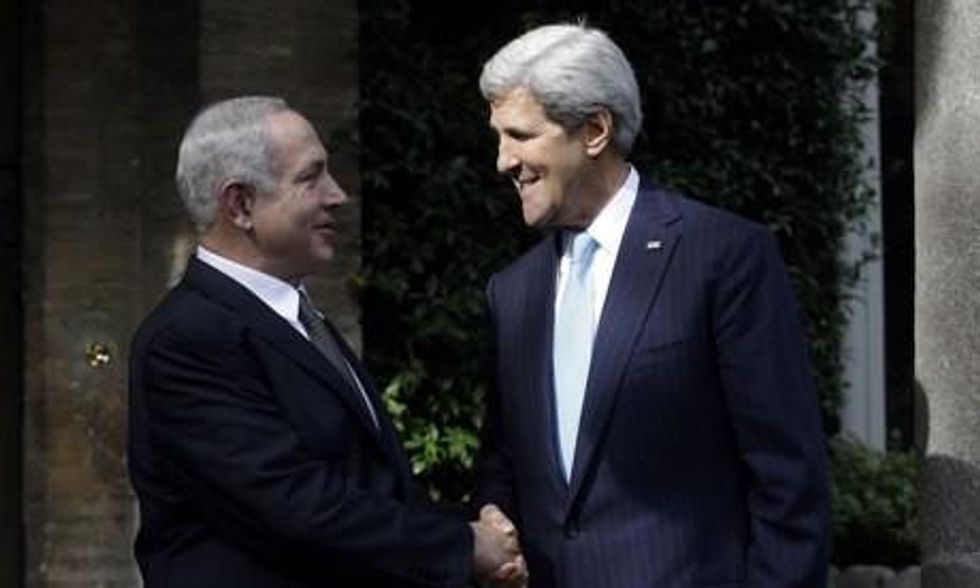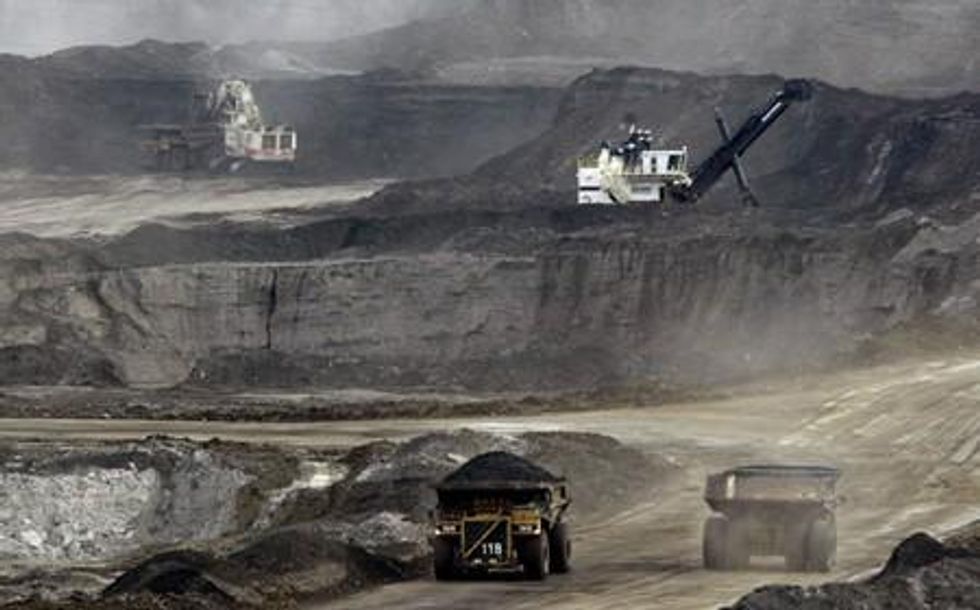The Composition of Kerry's Negotiating Team in Israel-Palestine
A few weeks back, the Guardian ran an article profiling the team that John Kerry has assembled to carry out his plan for bringing peace to Israel-Palestine. According to the story it includes some 10-12 people under the direction of the British-born and Australian-raised Martin Indyk, who for several decades has earned a living switching back and forth between in the influence-peddling sector as a major lobbyist-advocate for Israel, and in the US government, as a so-called "expert" on Middle

Indyk's devotion to the overall geo-strategic prerogatives of the Zionist state are so evident that he is often referred to in Washington policy circles as "Israel's lawyer."
According to the Guardian, the rest of the people on his team are: Ilan Goldenberg, Frank Lowenstein, David Makovsky, Julie Sawyer, Hady Amyr, Michael Yaffe, Laura Blumenfeld, Jonathan Schwartz, Phil Gordon, and Jon Allen.
While it is always a dicey proposition to impute the ethnic or religious background of someone from their name and/or online information, it would appear (and I am glad to proven wrong if it is not the case) that at least 7 of the 10 people on his team are Jewish. And of the people on the team whose names and/or available biographies provide somewhat less guidance in this regard, two, Hady Amr and Julie Sawyer, have held important appointments at the Saban Center at the Brookings Institution, the intellectual nerve center of so-called "liberal Zionism" in the US, which is to say, Zionism with almost all the same expansionist and ethnocratic goals as the Likudite brand, but with a less brutish and apocalyptical rhetoric.
Is it realistic to expect that a team of this particular makeup can or will serve as anything remotely resembling honest broker in the negotiations underway?
To state what I have just stated is, I know, to enter into what many consider to be scurrilous territory. I am aware--as my professor of Jewish Studies told me in no uncertain terms decades ago-- that to even raise the question of "dual-loyalty" in regard to the comportment of Jewish Americans is, for some, to engage in a contemporary form of "blood libel".
That's pretty strong stuff.
But if there is anything we have learned--or should have learned--in recent years it is that people and groups with entrenched positions of power (witness the serial and, at this point, frankly comical threats issued by James Clapper and his fellow fulminators to keep Dorothy and Toto--that's you and me--from looking at what is going on "behind the curtains" of the security state) will use any means of intimidation at their disposal to prevent public discourse from going to places where they do not want it to go.
So, the real question becomes, is it, in fact, a grave mental crime redolent of anti-Semitism to suspect that Jewish-Americans might be less than impartial when it comes matters concerning Israel?
This being the US, where there can be no differential treatment for any sub-group under our system of governance, we can resolve the question by asking, "What are the suppositions that have attended to the issue of dual-loyalty in other national and ethnic groups in the recent history of the US? "
During the last decades of the 19th century first third of the 20th century, the US was a key site of organization and financing for groups devoted to catalyzing nationalist movements in other places. The contributions of foreign-born US citizens and their offspring were absolutely essential to the consolidation of the Cuban, Czech, Slovak, Polish and Irish drives for national liberation during these times.
Did these people have dual loyalties? Of course they did! And very few people who know anything about this history would deny it.
It was against the backdrop of this then still quite recent history (obviously not without its strong xenophobic elements) that John Kennedy was forced to famously speak to the question of his Catholic identity.
Though the suspicions about his possible dual loyalty were quite vague, contrived and, had they been true, relatively trivial in terms of their possible impact on the US's geopolitical standing (Can we say the same about Indyk and company's role in Israel-Palestine?), he nonetheless felt the need to address them before the American people.
So, what has been the governmental approach to this issue in this country of immigrants?
In general, it has tacitly acknowledged the probable existence of partisan sympathies in regard to the country of origin within such activist groups, and this being the case, has--without openly condemning this very natural and generally benign phenomenon--nonetheless tended to shy away from having such people overly represented in operations or negotiations with a heavy bearing on the fate of their "other" country of spiritual allegiance.
For example, while the head of Bill Clinton's Northern Irish negotiating team, George Mitchell, was of Irish Catholic birth, he had quite little on his record--especially when compared to other Irish-American legislators--as an advocate for Ulster's Catholics before being named to his post on the President's negotiating team. If he was known for any ethnic identity, it was more for his Lebanese one.
Moreover, none of the three people running the policy shop behind him on the negotiations--Tony Lake, Nancy Soderberg and Jane Holl Lute--appear to have been Irish Catholics (as before, ready to stand corrected on this) or to have had any previous interest in the plight of Ulster's Catholics, or Unionists for that matter.
But let's imagine if Clinton had decided instead to appoint someone like NY Representative Peter King, a long-time advocate of the IRA's "right to defend itself" through violent means against the region's historically dominant Protestant Unionists, as the head of the negotiating team? And what if he then allowed him to put together a staff composed almost entirely of Irish Catholics?
Would it be a smear against the Irish Catholics in America, and throughout the world-wide Irish diaspora, to suggest that forming a team of these characteristics might not be a good idea, nor a particularly strong way of demonstrating this country's seriousness about arriving at a fair and just solution (a opposed to an unfair and imposed one) in that part of the world?
I don't think so. Rather, I think it would be seen as a fairly clear-cut case of exercising common sense.
And yet, if the US media silence on the issue is any indication, we are supposed to pretend that the make-up of the team that Kerry has put together, analogous in many ways to the King group I imagined in the case above, is of no real importance.
The case for respecting the media's injunction on this issue is further undermined by two other realities.
The first is the tendency among some of Israel's more high profile advocates in the US--Lawrence Summers comes most immediately to mind--to suggest that criticizing Israel is tantamount to engaging in anti-Semitism.
Indeed, this is one of the core assertions--in both its implied and explicit forms--of those who promote the notion that the world currently in the grip of a "New Anti-Semitism".
And this position is no longer just a matter of mere rhetoric among the televised class. In August of 2012, the California Legislature embedded this line of reasoning in law when it passed its HR 35, which holds, among other things, that suggesting that Israel is a racist or apartheid state, or that Israel has committed ethnic cleansing can and should be classified under the rubric of Anti-Semitism.
It's worth taking a moment to unpack the structure of that argument.
I may be wrong, but the belief here seems to be that criticism of Israel's acts is constitutes a slander upon the lives of the worldwide community of Jews. The underlying premise, then, would seem to be that all Jews are, in some way, morally or spiritually connected to the state of Israel, and from there, to each other.
If we accept that proposition, then doesn't it follow under the basic principles of reciprocal logic that all Jewish-Americans, including the ones on Kerry's negotiating team, are per se non-neutral and fundamentally biased parties when it comes to matters involving Israel?
I should make clear that I do not for a moment accept the premise that undergirds the school of thought I have just outlined, which to repeat, is that there is a moral umbilical cord that joins all Jews to Israel and, from there, to each other.
My sense is that Jews in America are, like everyone else under our system government, individuals first and foremost, people whose degree of devotion to particular foreign states and/ or the sub-culture they were born into is essentially unknowable.
Indeed, to embrace the underlying reasoning of HR 35 would force me, as someone who believes that any argument applied to a Jew and his ethnic milieu can be applied to me and mine, to also accept the absurd notion that a similar device of ethnic transitivity binds me morally, as a fellow Irish-American, to Peter King's boorish support of IRA violence.
The point here is that you can't have it both ways.
You can't make arguments that rest on the presumption of a seamless connectivity between Israel and the world-wide community of Jews, while simultaneously resisting the idea--and having the accusation Anti-Semitism hang like a Sword of Damocles over the heads of those who might deign to bring it up--that having a team headed by a prominent advocate for Israel, and made up largely of American Jews, might not be a really honest or effective way of "brokering" peace in the Israel-Palestine region.
The second undermining factor here is that, since September 11th, neither our government nor our media establishment has had much compunction about spreading the suspicions of "dual loyalty" in regard US-based Muslims in general, and Arabs in particular. Just ask a friend from one of these groups about what it is like to pass through airport security or to apply for a job in our government.
If it is outrageous to even think about the possible dual loyalty of Jews, isn't it also outrageous, in this country where it is patently illegal to grant or deny legal rights on the basis of ethnic identity, to contemplate, never mind institutionalize into an entire array of harassing and prosecutorial practices, the idea of Muslim and/or Arab dual loyalty?
Of course it is.
But I am not holding my breath waiting for the Pamela Gellers and David Horowitzes of the world, and important neo-cons in our government who regularly allege the same things in in somewhat subtler tones, to stop promoting this class of suspicions, suspicions that, if they were directed at Jews, would provoke loud cries about discrimination and/or Anti-Semitism.
Dual loyalties have been a ubiquitous part of the American experience.
For the most part, however, they have been harmless to the overall health of this country.
One reason for this is that public officials, aware of the potentially corrosive nature of such things, have generally been prudent about embedding people with highly-divided loyalties too deeply within policy-making structures with a direct bearing on what could be perceived as such people's secondary country of allegiance.
This prudence has long-since been abandoned in the case of US involvement in Israel-Palestine.
To suggest that it is Anti-Semitic to point this out, is rather mendacious, especially when high profile American supporters of Israel regularly advance arguments--some of which have now been written into US law--that presume the existence of a seamless moral bond between all US Jews and the geo-strategic prerogatives of the state of Israel. Or who regularly and quite zealously impute malignant "dual-loyalties" to millions of Muslim Americans and encourage our government to treat them in way that differ sharply from the ways it treats people of other national or ethnic backgrounds.
Post Script: Two days ago, Mahmoud Abbas, the man who is paid handsomely to serve a as Israel's ever-pliable Palestinian "negotiating partner" described Kerry's peace plan as "madness". Should we be surprised given the composition of Kerry's negotiating team?

